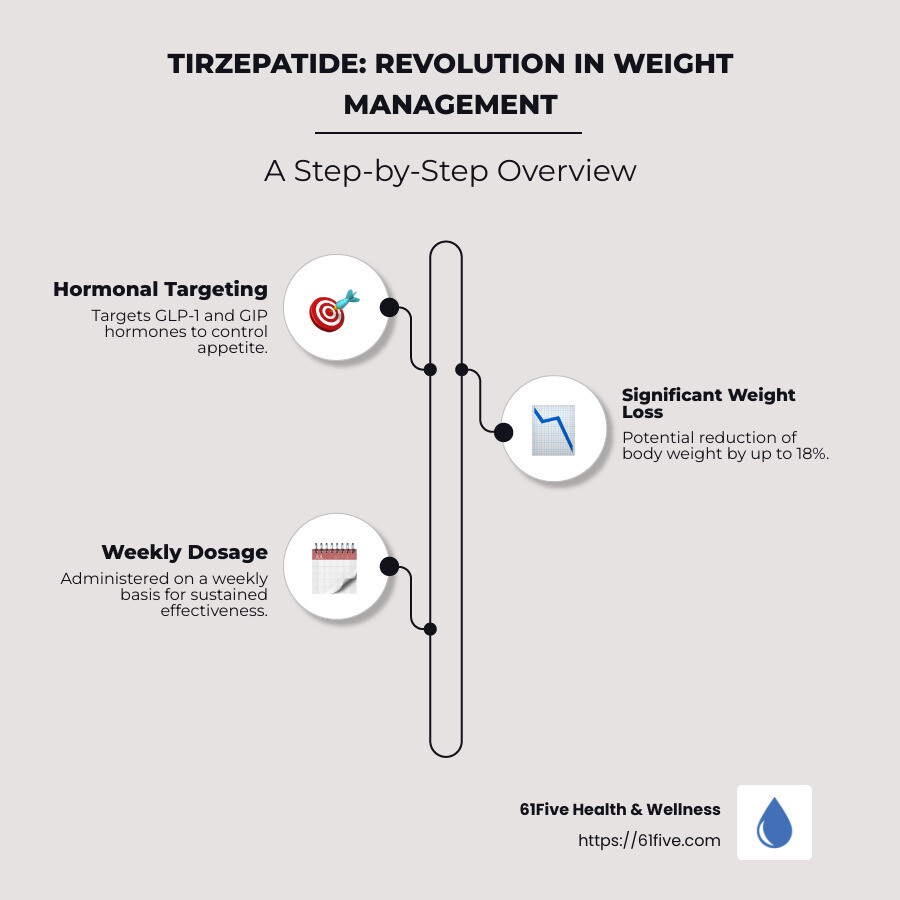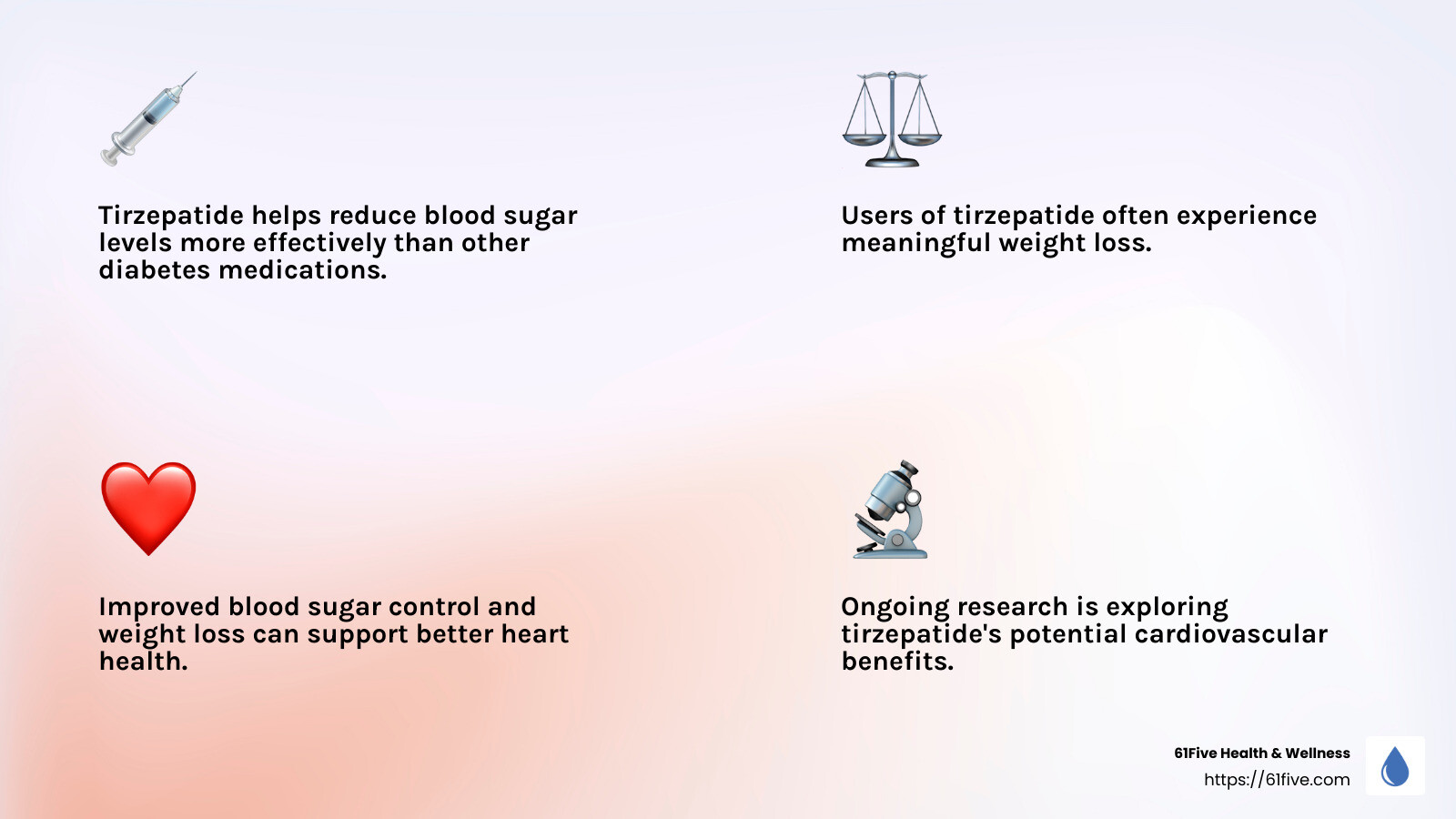Tirzepatide: A New Approach to Weight Management
Tirzepatide is making waves in health and wellness for its effectiveness in managing weight, obesity, and diabetes. Here are the key insights:
- What is Tirzepatide? A groundbreaking medication approved for chronic weight management and diabetes control.
- How does it work? It targets hormones GLP-1 and GIP to control appetite, leading to significant weight loss.
- Who can benefit? Adults with a BMI of 27 or greater, especially those with weight-related conditions like type 2 diabetes.
- Are there side effects? Common ones include nausea, diarrhea, and possible vision changes.
When nearly 70% of American adults struggle with obesity or are overweight, managing these conditions is crucial. Obesity is linked to leading causes of death, including heart disease and diabetes. With the FDA’s approval of tirzepatide, branded as Zepbound for weight loss and Mounjaro for diabetes, there’s new hope. This medication offers significant promise by potentially reducing body weight by up to 18% for some users.
For many, tirzepatide is more than a treatment; it’s a chance to regain control over their health and lifestyle. As an effective weapon against obesity’s challenges, it represents a future where managing weight and related health concerns is both achievable and sustainable.
What is Tirzepatide?
Tirzepatide is a cutting-edge medication designed to tackle both type 2 diabetes and obesity. It stands out because it acts as both a GLP-1 receptor agonist and a GIP analog. Let’s break down what that means.
Antidiabetic Medication
Tirzepatide is primarily known for its role in managing type 2 diabetes. It helps regulate blood sugar levels by mimicking the actions of natural hormones in the body. This dual action makes it a powerful tool for those struggling with diabetes.
GLP-1 Receptor Agonist
GLP-1, or glucagon-like peptide-1, is a hormone that plays a vital role in controlling blood sugar and appetite. Medications that activate the GLP-1 receptor can help reduce blood sugar levels and promote weight loss by increasing insulin secretion and decreasing appetite.
GIP Analog
GIP, or glucose-dependent insulinotropic polypeptide, is another hormone involved in insulin regulation. Tirzepatide acts as a GIP analog, meaning it mimics the actions of GIP to further improve insulin release. This dual mechanism—targeting both GLP-1 and GIP receptors—sets tirzepatide apart from other medications that only focus on one pathway.
This unique combination helps to lower blood sugar levels and support weight loss effectively. It’s a promising option for individuals looking for a comprehensive approach to manage their diabetes and weight.
Mechanism of Action
Tirzepatide operates uniquely as a dual agonist, targeting two hormone receptors: GLP-1 and GIP. This dual engagement provides an effective approach for managing blood sugar and weight.
Dual Agonist
Unlike treatments that focus on a single hormone, tirzepatide activates both GLP-1 and GIP receptors. This dual action is crucial to its success, allowing the medication to leverage the benefits of both hormones for improved outcomes.
Insulin Secretion
A significant advantage of this dual action is enhanced insulin secretion. Tirzepatide prompts the pancreas to release more insulin, particularly after meals, helping to maintain blood sugar levels. This is vital for individuals with type 2 diabetes, as tirzepatide mimics natural hormones to ensure insulin is released when needed.
Appetite Reduction
Beyond blood sugar control, tirzepatide aids in weight management by curbing appetite. It signals fullness to the brain, potentially leading to reduced food intake and weight loss. This is especially beneficial for those facing obesity, as it helps manage cravings and promotes healthier eating habits.
Tirzepatide provides a comprehensive strategy for managing diabetes and obesity. By acting on both GLP-1 and GIP receptors, it enhances insulin secretion and reduces appetite, making it a promising option for those seeking better health control.
Medical Uses and Benefits
Tirzepatide has emerged as a significant player in the treatment of type 2 diabetes and weight management. Its dual action on GLP-1 and GIP receptors makes it a versatile medication with multiple health benefits.
Type 2 Diabetes
For individuals with type 2 diabetes, tirzepatide offers a new way to manage blood sugar levels. By enhancing insulin secretion, it helps maintain more stable glucose levels throughout the day. This can lead to fewer blood sugar spikes and a reduced need for additional medications. Clinical trials have shown that patients using tirzepatide achieved greater reductions in blood sugar compared to those using other medications. This makes it a strong option for those struggling to keep their diabetes under control.
Weight Loss
Beyond diabetes management, tirzepatide is also effective for weight loss. Many users experience significant reductions in body weight, which is crucial for overall health. Studies have found that tirzepatide users were more likely to achieve meaningful weight loss compared to those on other treatments. This weight reduction is particularly beneficial for non-diabetic individuals as well, helping to lower the risk of developing obesity-related conditions.
Heart Failure Benefits
While more research is needed, there are promising signs that tirzepatide may offer benefits for heart health. Weight loss and better blood sugar control can contribute to improved cardiovascular outcomes. As obesity and diabetes are risk factors for heart disease, managing these conditions can potentially reduce the risk of heart complications. Future studies are expected to explore these benefits further, providing more insights into how tirzepatide could support heart health.
In summary, tirzepatide provides a multifaceted approach to health management. Its ability to control blood sugar, promote weight loss, and potentially support heart health makes it a valuable tool for those looking to improve their overall well-being.
Side Effects and Contraindications
While tirzepatide is a promising option for managing type 2 diabetes and aiding weight loss, it’s important to be aware of its potential side effects and contraindications. Let’s explore some of the key concerns.
Nausea and Gastrointestinal Issues
One of the most common side effects reported by tirzepatide users is nausea. This often occurs alongside other gastrointestinal issues such as bloating, diarrhea, and vomiting. These symptoms are typically mild to moderate and tend to decrease over time as the body adjusts to the medication. However, if they persist or worsen, it’s crucial to consult with a healthcare professional.
Thyroid Cancer Risk
There is a potential risk associated with thyroid cancer, particularly medullary thyroid carcinoma (MTC). In animal studies, tirzepatide has been shown to cause thyroid C-cell tumors. Although it’s not yet confirmed if this risk applies to humans, individuals with a personal or family history of MTC or Multiple Endocrine Neoplasia syndrome type 2 should avoid using tirzepatide. Always discuss your medical history with your doctor to ensure this medication is safe for you.
Who Should Avoid Tirzepatide?
Tirzepatide is not suitable for everyone. Apart from those with a history of thyroid cancer, individuals with severe gastrointestinal diseases, such as gastroparesis, should also avoid this medication. Additionally, those who have experienced severe allergic reactions to tirzepatide or its ingredients should refrain from using it. Pregnant or breastfeeding women should also consult their healthcare provider before starting tirzepatide.
In conclusion, while tirzepatide offers significant benefits, weigh these against potential side effects and contraindications. Always consult with a healthcare provider to determine if tirzepatide is the right choice for your health needs.
Frequently Asked Questions about Tirzepatide
Are Ozempic and Tirzepatide the same?
No, Ozempic and tirzepatide are not the same, but they do share some similarities. Both medications are used to manage type 2 diabetes and aid in weight loss. Ozempic works primarily as a GLP-1 receptor agonist. This means it mimics the GLP-1 hormone, which helps lower blood sugar levels and reduce appetite.
Tirzepatide, on the other hand, is a dual agonist. It targets both the GLP-1 and GIP receptors. The GIP hormone plays a significant role in insulin secretion and fat metabolism. This dual action can lead to more significant reductions in blood sugar and body weight compared to medications that target only one hormone.
What are the drawbacks of Tirzepatide?
While tirzepatide has shown promise, it does come with its share of drawbacks. The most common side effects are related to the gastrointestinal system. Users often report nausea, diarrhea, and vomiting. These side effects are usually dose-dependent, meaning they can increase with higher doses of the medication.
There’s also a concern about the risk of thyroid cancer, particularly medullary thyroid carcinoma (MTC). Although this risk has been observed in animal studies, it’s not yet confirmed in humans. However, it remains a point of caution.
Who cannot take Tirzepatide?
Certain individuals should avoid tirzepatide. Those with a personal or family history of thyroid cancer, especially medullary thyroid carcinoma, should steer clear of this medication. Additionally, tirzepatide is not recommended for people with severe gastrointestinal issues like gastroparesis.
Pregnant or breastfeeding women should consult their healthcare provider before considering tirzepatide. It’s crucial to discuss all medical conditions and current medications with a healthcare professional to ensure tirzepatide is safe and appropriate for your situation.
Conclusion
At 61Five Health & Wellness, we believe in a comprehensive approach to health that goes beyond standard treatments. Our focus is on personalized treatments that cater to the unique needs of each individual. This philosophy extends to our weight management solutions, where we integrate medications like tirzepatide into a broader wellness strategy.
Tirzepatide has emerged as a promising option for those struggling with weight management and type 2 diabetes. Its dual action on GLP-1 and GIP receptors not only aids in controlling blood sugar but also supports significant weight loss. However, we understand that medication is just one piece of the puzzle. That’s why we emphasize patient education and lifestyle changes, such as diet and exercise, to ensure lasting results.
Our comprehensive wellness approach means we’re with you every step of the way. From initial consultations to ongoing support, our team is dedicated to helping you achieve your health goals. We offer services like mobile IV therapy and skin care, making it easier for you to integrate health and wellness into your daily life.
If you’re interested in exploring how tirzepatide can be part of your weight management journey, we invite you to learn more about our services. Visit our semaglutide weight loss page to find how we can support your path to better health.



